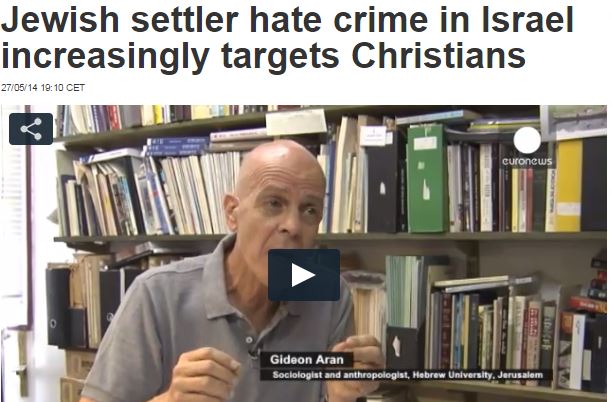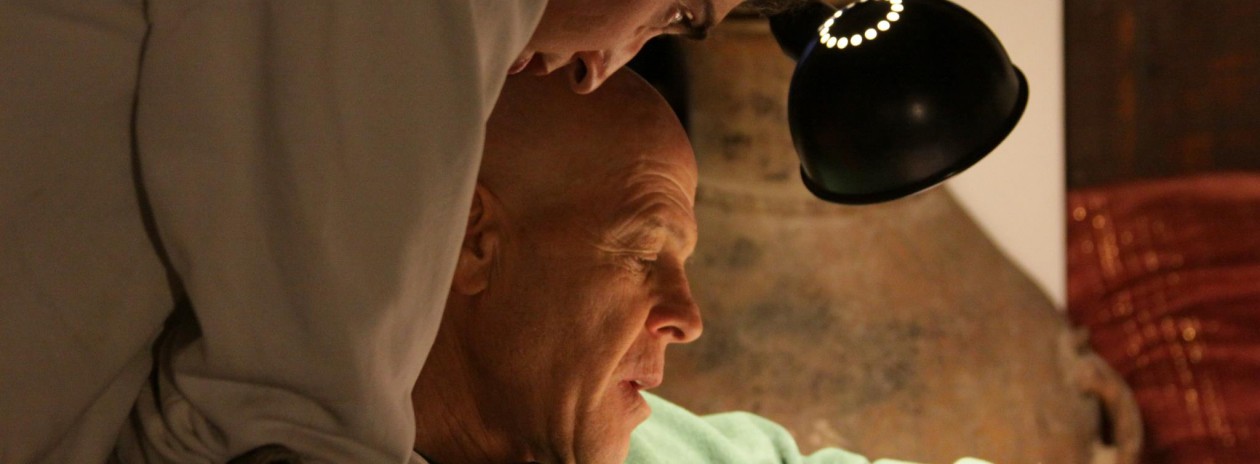Jerusalem is holy three times – for the Jews, Christians and Muslims: What makes a peaceful co-existence here so difficult?
From Euronews with Luis Carballo –Prof. Gideon Aran was Interviewed On the occasion of Pope Francis visit to the Holy Land.
1. First, let me state it clear – considering the circumstances, the current Jerusalemite interfaith relations are not too bad. The frequency and intensity of the recent violent incidents are low, especially if you view it in historical perspective (think of the Crusaders bloody massacre of both Jews and Muslims…), and if you compare it to other religiously charged places with explosive potentiality across the globe (like Nigeria, Iraq, Lebanon and more).
Watch the full Interview:

2. The above mentioned relative quiet is particularly impressive if you take into account the fact that it is not just a religious divide, but also a national strife with socio-economic and cultural implications as well. Actually, the religious rivalry is superimposed upon the political armed confrontation, and this makes the Middle-Eastern conflict much harder to solve.
3. What makes the religious reality in Jerusalem unique and particularly interesting is the fact that there are three protagonists here. In Jerusalem three – essentially exclusive – religions compete with each other. In most past and present analogous cases there is a frontal opposition between just two players, which results in a zero-sum game. See the classic opposition between Christianity and Islam in Istanbul, for example. Once a dyad becomes a triad, new options open, among them the option of creating coalitions, that is, alliance of two partners against a third party, and then it may occasionally change. Such coalitions may increase tension or decrease it. Right now, for instance, Jews in Jerusalem collaborate with Christians (including Arab Christians!) against their common enemy – Islamic Fundamentalism. On other issues Muslims and Christians join forces against Jews.
4. Let’s face it: each of the three Abrahamic religions claims to monopolize the “truth”, despite their common ancestry or rather because of it. As they emerged along history, first Judaism, followed by Christianity and later Islam, each established itself in an alternative distinct place, far away and very different from the other: Jerusalem, Rome, Mecca. And yet, at the same time, in a dialectical counter tendency, all three were attracted to the same original site, coming back to Jerusalem and insisting on exclusivity or at least a suprimacy there.
Paradoxically enough they shed much blood – theirs and others’ – to replace each other at the very tiny spot –less than one square Km where so many holy sites are squeezed in. Please join me in observing the Old City – look at the monumental structures, one a top the other, or juxtaposed with the other: The remains of the Davidic temple constructed at the 10-8 century BC, and the Herodian temple destructed in the 1st century AD, then the Al-Aksa mosque and the Dome of the Rock erected at the 7th century, and then, beginning at the early Middle-ages, the building of the many layers of the Holy Sepulture.
And mind you, on the early 20th century, Protestant Christianity put up its own sacred places – look at the Holy redeemer Lutheran Church, of course, meant to be the tallest tower within the walls, only 50 meters far from the Roman Catholic and the Greek Orthodox Church, and the Ethiopian, and the Armenian, and the Assyrian, etc etc..
Lately Price Tag attacks are targeting not only Muslim but also Christian institutions: Why this change?
1. Nothing is new under the sun. There are several precedent cases to the recent one. I remember from my early childhood in Jerusalem during the Fifties and Sixties some incidents of violence – mainly symbolic violence – directed against local clergy and monasteries. It was especially intensive during the first years after the foundation of the state, when the churches were engaged in intensive and quite explicit missionary work, focusing on the conversion of low class new immigrants Jews and holocaust survivors.

2. Israeli Orthodoxy consists about 20% of the local Jewish population. A certain portion of these religious people truly believe that Israel’s arch enemy is not the Arabs and Muslims but the Christian world. Ironically some of the most extreme anti-Palestinian religious Jews (particularly the hawkish far-Right wing of the National-Religious) claim that the ultimate and deeper confrontation is the one with the Church with whom there are still some fundamental theological as well as blood accounts to settle.
It is only due to current geo-political emergency reality or strategic pressing reality that the Jewish attention is temporarily diverted to the Middle Eastern conflict. Once the regional 100 years old tough problem will be finally solved and all Arabs will be defeated and evacuated, then all religious energies will be directed to retribution and winning over Christianity.
3. Actually at present, the real target of Price tag activities is neither Muslims nor Christians but Jews. They try hard to embarrass the “establishment” – the Israeli government on the one hand, and the Jewish West bank settlement leadership on the other hand. They claim that both betray their mission, and they employ different kinds of provocations to present them as cowardly, hypocrite and impotent.
4. Price Tag is not a well organized underground committed to a systematic and coherent ideology. This phenomenon is made of peripheral youth, mainly dropouts, bordering with juvenile delinquency that act out its frustrated aggression and select targets quite randomly. In a sense their behavior could be seen as hooliganism and should be treated as adolescent anarchism. Now, this is not to belittle their import or under-rate their danger ,but to clarify the grave situation which may radically change from bad to worse if not promptly tackled.
Prof Gideon Aran was Interviewed to Euronews with Luis Carballo On the occasion of Pope Francis visit to the Holy Land.



